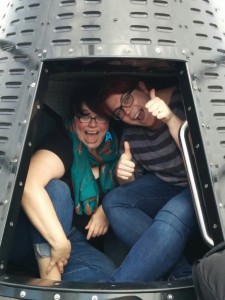Ever since meeting in library school, we have often had long and in-depth discussions about our personal and professional interests, from comics and video games to cataloguing and digitization techniques. It was during one such conversation over beers in a pub one night that we decided: We always have such great discussions, we should be recording them! The idea was as simple as that. What followed was weeks of planning and learning how to use recording equipment and audio editing software, but the process was relatively simple. The learning curve was not insurmountably steep.
Most importantly, no one else had control over our message.
We started the S.S. Librarianship podcast, a bi-monthly program through which we discuss nerd culture and library issues, not only because we were both avid podcast listeners but also because of the way the medium has been shaped by its communities. The podcast, at its core, is a democratizing form of media that exists in a realm of truly free expression—one free from the concentrated, corporate control of more mainstream media. While legacy media companies do produce podcasts, such as National Public Radio’s popular Serial, they are not the only ones who can, nor are they necessarily the most successful. Podcast creation is relatively easy and inexpensive, as is finding an audience if you have time to devote to promotion. For most podcasters, the format is free from traditional funding or editorial structures. Podcasters, after all, were pioneers of the crowdfunding movement, reaching out to fans to keep editorial control in the hands of the creators.
There are many examples of this autonomy, but one that hits home for us is CANADALAND, Canadian journalist Jesse Brown’s burgeoning crowdfunded podcast empire. Brown and his team are critical of Canadian media, politics, and arts to an extent that our country’s larger media companies—even the arm’s-length CBC—do not have the freedom. The accessibility of the technology involved allows podcasters to freely express perspectives unique in the media landscape, highlighting the voices and experiences of people traditionally overlooked and creating an uncensored public space, free of professional or corporate restrictions on free speech.
As podcasters in the library sphere, our goal is twofold. First, we want to have fun. We have developed a highly personal podcasting style that aims at humour, attempting to represent librarians as well-rounded and interesting people. We are nerds, but we like to approach the contemporary explosion of nerd culture with a critical eye that informs while entertaining. Segments of our show like “Mind Grapes” and “Nerd Alert!” centre on the idea that while our work as librarians is a significant part of our life and informs our approach, it is not all that we are. Work-life balance can be a challenge, and we want our podcast to address both in a meaningful way.
Second, we too want to use podcasting to create space for truly democratic discourse. We started the show as students, talked through our MLIS degrees, spoke honestly about our process of job hunting, and illuminated some of the unique challenges we faced finding our footing on the ever-shifting and precarious sands of our profession. We have used our platform for frank discussions about our experiences as new professionals—from becoming part of organizations undergoing rapid and dramatic change, to dealing with the challenges of incorporating new technologies into library workflows, or just learning how to say ‘no’ and maintain a life outside of the library. We have set ourselves the goal of providing our listeners, many of whom are students or new professionals themselves, with an honest account of what it is like to enter the profession today.
We knew our podcast would be a sustainable project not only because we love to talk, but also because librarianship attracts fascinating people with rich knowledge and experiences to share. We strive to provide an unfettered platform for our guests to explore the ideas they are interested in. We never push too hard, but we do ask complex questions and offer our friends and colleagues space for reflection. Our guests have taught us about topics such as indigenous librarianship; queer librarianship; the place of video games, zines, and other alternative media in libraries; and library technicians’ quest for equal access to recognition and professional development—just to name a few.
Our podcast is our platform, and ours alone. We make it clear on our website that we do not speak for our employers. With that power comes responsibility, and we do not always succeed in our goal of being critical and reflective. Sometimes we are more interested in having fun, or venting a little. Often we fail to examine all sides of an issue. But part of the unique thrill that comes from putting something that you made on the Internet is the discussion that follows. We have accumulated enough of a following over nearly three years of podcasting that often, if we have a blind spot, it gets pointed out to us, and the ensuing conversation enriches everyone involved.
Bob Dylan once said that he only started writing music because other people weren’t writing the kinds of songs he wanted to play. The bottom line for us as podcasters is to make something new, something unique, and above all, something we would want to listen to. We wanted to hear our friends’ stories and discuss the changing nature of the information profession. We wanted to hear feminist critiques of Marvel movies alongside deep discussions about digital literacy. If others want to hear those things too? Well, that’s just gravy.
Sam Mills (@dothenextthing) and Alli Sullivan (@navillusnosilla) are Vancouver librarians, proud nerds, and the hosts of S.S. Librarianship, a (roughly) twice-monthly podcast for librarians and the nerds who love them. Interested in sharing your experiences and/or nerding out with us? Check out sslibrarianship.com, or join the conversation: @sslibrarianship / [email protected].
Test


